人教版六年级上册英语知识点总结
- 格式:doc
- 大小:59.50 KB
- 文档页数:3
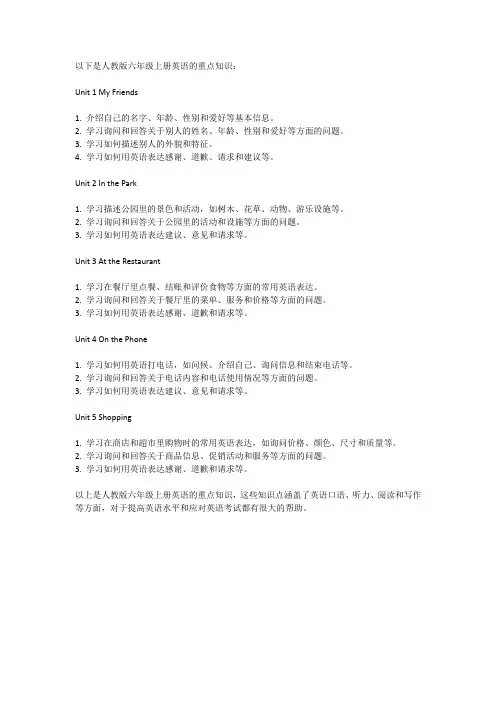
以下是人教版六年级上册英语的重点知识:
Unit 1 My Friends
1. 介绍自己的名字、年龄、性别和爱好等基本信息。
2. 学习询问和回答关于别人的姓名、年龄、性别和爱好等方面的问题。
3. 学习如何描述别人的外貌和特征。
4. 学习如何用英语表达感谢、道歉、请求和建议等。
Unit 2 In the Park
1. 学习描述公园里的景色和活动,如树木、花草、动物、游乐设施等。
2. 学习询问和回答关于公园里的活动和设施等方面的问题。
3. 学习如何用英语表达建议、意见和请求等。
Unit 3 At the Restaurant
1. 学习在餐厅里点餐、结账和评价食物等方面的常用英语表达。
2. 学习询问和回答关于餐厅里的菜单、服务和价格等方面的问题。
3. 学习如何用英语表达感谢、道歉和请求等。
Unit 4 On the Phone
1. 学习如何用英语打电话,如问候、介绍自己、询问信息和结束电话等。
2. 学习询问和回答关于电话内容和电话使用情况等方面的问题。
3. 学习如何用英语表达建议、意见和请求等。
Unit 5 Shopping
1. 学习在商店和超市里购物时的常用英语表达,如询问价格、颜色、尺寸和质量等。
2. 学习询问和回答关于商品信息、促销活动和服务等方面的问题。
3. 学习如何用英语表达感谢、道歉和请求等。
以上是人教版六年级上册英语的重点知识,这些知识点涵盖了英语口语、听力、阅读和写作等方面,对于提高英语水平和应对英语考试都有很大的帮助。
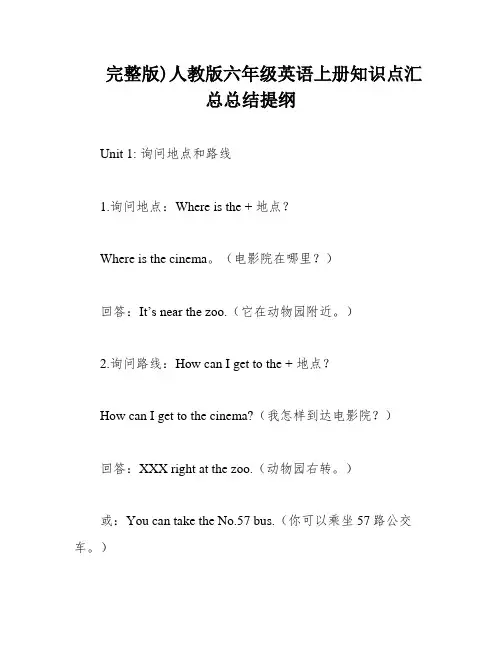
完整版)人教版六年级英语上册知识点汇总总结提纲Unit 1: 询问地点和路线1.询问地点:Where is the + 地点?Where is the cinema。
(电影院在哪里?)回答:It’s near the zoo.(它在动物园附近。
)2.询问路线:How can I get to the + 地点?How can I get to the cinema?(我怎样到达电影院?)回答:XXX right at the zoo.(动物园右转。
)或:You can take the No.57 bus.(你可以乘坐57路公交车。
)Unit 2: 交通方式1.询问某人怎样去某地:How do某人go(come) to + 地点?How do you go to school?(你怎么去学校?)回答:I go to school on foot.(我走路去学校。
)2.规定某人必须做某事:某人 + must + 动词原形XXX.(骑自行车的人必须戴头盔。
)I must pay n to the traffic XXX.(我必须注意交通信号灯。
)Unit 3: 打算做某事某人 + be going to + do(动词原形)She is going to see a film.(她打算去看电影。
)My uncle is planningXXX to go to the supermarket。
In this unit。
there are several types of ns that we can use to XXX。
For example。
we can ask "What are you going to do (+time or place)?" or "When are you going (+place)?" to get an XXX may include phrases such as "I am going to the cinema tomorrow" or "They are going to Nanjing next week."Similarly。
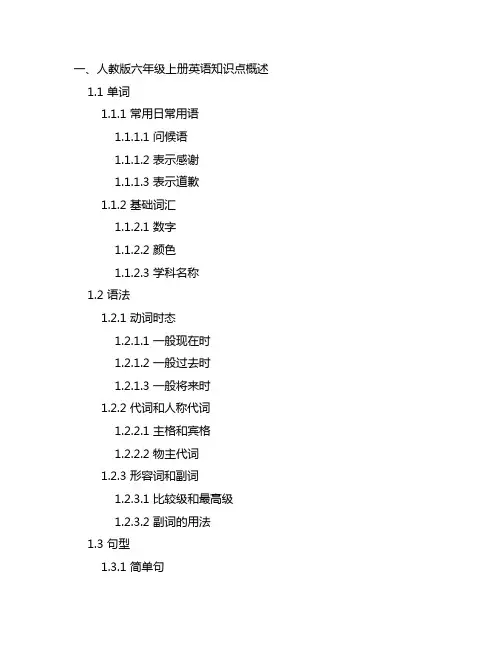
一、人教版六年级上册英语知识点概述1.1 单词1.1.1 常用日常用语1.1.1.1 问候语1.1.1.2 表示感谢1.1.1.3 表示道歉1.1.2 基础词汇1.1.2.1 数字1.1.2.2 颜色1.1.2.3 学科名称1.2 语法1.2.1 动词时态1.2.1.1 一般现在时1.2.1.2 一般过去时1.2.1.3 一般将来时1.2.2 代词和人称代词1.2.2.1 主格和宾格1.2.2.2 物主代词1.2.3 形容词和副词1.2.3.1 比较级和最高级1.2.3.2 副词的用法1.3 句型1.3.1 简单句1.3.1.1 肯定句1.3.1.2 否定句1.3.1.3 疑问句1.3.2 复合句1.3.2.1 并列句1.3.2.2 定语从句1.3.2.3 状语从句二、人教版六年级上册英语知识点详解2.1 单词2.1.1 常用日常用语2.1.1.1 问候语问候语是指在英语日常交际中用于打招呼和示好的常用词汇,包括Hello、Hi、Good morning、Good afternoon等等。
2.1.1.2 表示感谢表示感谢的常用词汇有Thank you、Thanks a lot、Thank you very much等,用于表达对别人的帮助或礼物表示感激之情。
2.1.1.3 表示道歉表示道歉的词汇包括I'm sorry、Excuse me、Pardon等,在日常生活中,用于向别人道歉或请求对方让步的场合。
2.1.2 基础词汇2.1.2.1 数字数字是英语基础词汇的重要部分,包括基本的数字表达方式和计量单位,如one、two、three等,以及hundred、thousand等。
2.1.2.2 颜色颜色是描述事物外观的重要词汇,在日常交流中也经常用到,包括red、blue、yellow等常见颜色词汇。
2.1.2.3 学科名称学科名称涉及到人们日常生活和学习工作的方方面面,包括mathematics、music、art等,是学习英语时必须掌握的词汇。
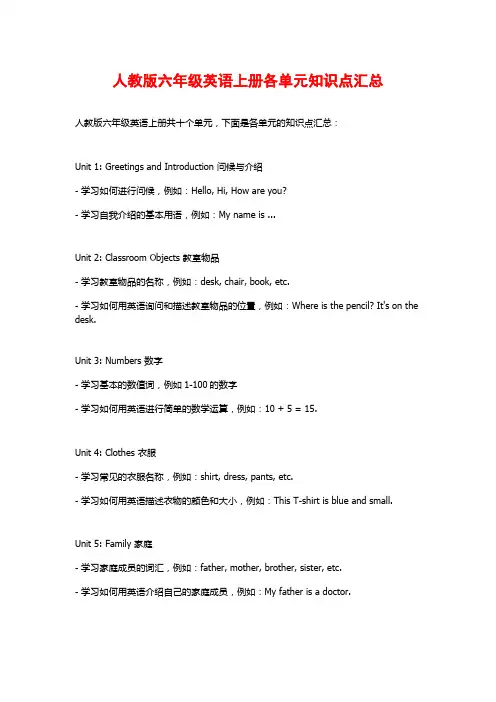
人教版六年级英语上册各单元知识点汇总人教版六年级英语上册共十个单元,下面是各单元的知识点汇总:Unit 1: Greetings and Introduction 问候与介绍- 学习如何进行问候,例如:Hello, Hi, How are you?- 学习自我介绍的基本用语,例如:My name is ...Unit 2: Classroom Objects 教室物品- 学习教室物品的名称,例如:desk, chair, book, etc.- 学习如何用英语询问和描述教室物品的位置,例如:Where is the pencil? It's on the desk.Unit 3: Numbers 数字- 学习基本的数值词,例如1-100的数字- 学习如何用英语进行简单的数学运算,例如:10 + 5 = 15.Unit 4: Clothes 衣服- 学习常见的衣服名称,例如:shirt, dress, pants, etc.- 学习如何用英语描述衣物的颜色和大小,例如:This T-shirt is blue and small.Unit 5: Family 家庭- 学习家庭成员的词汇,例如:father, mother, brother, sister, etc.- 学习如何用英语介绍自己的家庭成员,例如:My father is a doctor.Unit 6: Food 食物- 学习常见的食物名称,例如:apple, banana, bread, etc.- 学习如何用英语描述食物的味道和口感,例如:This banana is sweet and tasty.Unit 7: School Life 学校生活- 学习学校生活的用语,例如:go to school, have classes, play games, etc.- 学习如何用英语描述学校生活的常见活动,例如:I have English class at 9 o'clock.Unit 8: Hobbies and Free Time 爱好和业余时间- 学习常见的爱好词汇,例如:sing, dance, swim, etc.- 学习如何用英语询问和回答关于业余时间的问题,例如:What do you do in your free time? I like playing basketball.Unit 9: Daily Routine 日常生活- 学习描述日常活动的词汇,例如:get up, have breakfast, go to bed, etc.- 学习如何用英语描述自己的日常作息安排,例如:I get up at 7 o'clock in the morning.Unit 10: Travel and Places 旅行和地方- 学习关于旅行和地方的基本词汇,例如:train, bus, hotel, etc.- 学习如何用英语询问和指路,例如:Excuse me, how can I get to the post office? 希望对你有帮助!。
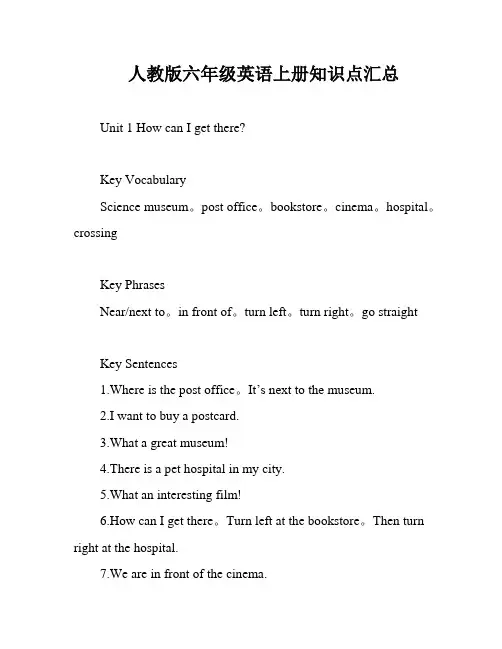
人教版六年级英语上册知识点汇总Unit 1 How can I get there?Key VocabularyScience museum。
post office。
bookstore。
cinema。
hospital。
crossingKey PhrasesNear/next to。
in front of。
turn left。
turn right。
go straightKey Sentences1.Where is the post office。
It’s next to the museum.2.I want to buy a postcard.3.What a great museum!4.There is a pet hospital in my city.5.What an interesting film!6.How can I get there。
Turn left at the bookstore。
Then turn right at the hospital.7.We are in front of the cinema.8.Now we are behind the hospital.9.Is it far from our school?10.Follow me。
please!Unit 2 Ways to go to schoolKey PhrasesWalk/on foot。
by bus。
by plane。
by train。
by taxi。
by ship。
by subway。
slow downKey Sentences1.How do you come to school。
Usually I come on foot。
Sometimes I come by bus.2.That’s good exercise.Let's go to the nature park for a day out.How can I travel from China to the USA?How do I reach Fuxing Hospital?Take the No.57 bus to reach there.In the USA。
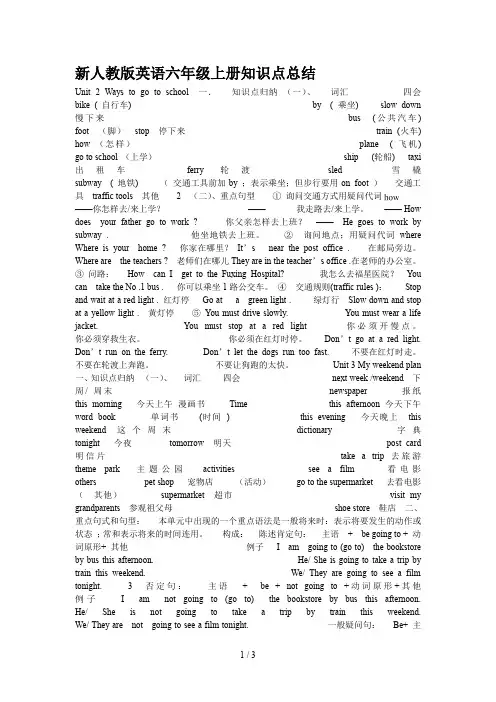
新人教版英语六年级上册知识点总结Unit 2 Ways to go to school 一.知识点归纳(一)、词汇四会bike ( 自行车) by ( 乘坐) slow down 慢下来bus (公共汽车) foot (脚)stop 停下来train (火车) how (怎样)plane ( 飞机) go to school (上学)ship (轮船) taxi 出租车ferry 轮渡sled 雪橇subway ( 地铁) (交通工具前加by ;表示乘坐;但步行要用on foot )交通工具traffic tools 其他 2 (二)、重点句型①询问交通方式用疑问代词——你怎样去/来上学?——我走路去/来上学。
—— How does your father go to work ? 你父亲怎样去上班?——He goes to work by subway . 他坐地铁去上班。
②询问地点;用疑问代词where Where is your home ? 你家在哪里?It’s near the post office . 在邮局旁边。
Where are the teachers ? 老师们在哪儿They are in the teacher’s office .在老师的办公室。
③问路:How can I get to the Fuxing Hospital? 我怎么去福星医院?You can take the No .1 bus . 你可以乘坐1路公交车。
④交通规则(traffic rules ):Stop and wait at a red light . 红灯停Go at a green light . 绿灯行Slow down and stop at a yellow light . 黄灯停⑤You must drive slowly. You must wear a life jacket. You must stop at a red light 你必须开慢点。

Unit 1 How can I get there?一、词汇与短语1、重点单词1.science /ˈsaɪəns/ 科学2.museum /mjuˈziːəm/ 博物馆3.post office /ˈpəʊst ɒfɪs/ 邮局4.bookstore /ˈbʊkstɔː/ 书店5.cinema /ˈsɪnəmə/ 电影院6.hospital /ˈhɒspɪtl/ 医院7.crossing /ˈkrɒsɪŋ/ 十字路口8.turn /tɜːn/ 转湾9.left /left/ 左10.right /raɪt/ 右11.straight /streɪt/ 笔直地12.ask /ɑːsk/ 问13.sir /sɜː(r)/ (对男子的礼貌称呼)先生14.interesting /ˈɪntrəstɪŋ/ 有趣的15.Italian /ɪˈtæliən/ 意大利的16.restaurant /ˈrestrɒnt/ 餐馆17.pizza /ˈpiːtsə/ 比萨饼18.street /striːt]/ 大街;街道19.get /get/ 到达20.gave /ɡeɪv/( give/ɡɪv/的过去式) 给21.follow /ˈfɒləʊ/ 跟着22.tell /tel/ 告诉2、重点短语1.science museum 科学博物馆2.near the library 图书馆附近3.get there 到达那里4.go straight 直走5.turn left/right 向左转/右转6.over there 在那边7.next to the museum 在博物馆旁边8.pet hospital 宠物医院9.Palace museum 故宫博物院10.in front of 在…前面11.behind the post office 在邮局后面12.beside the park 在公园旁边13.be far from 离……很远14.be far from home 远离家乡3、重点句子1. --Where is the museum shop?博物馆商店在哪里--It's near the door. 它在门附近。
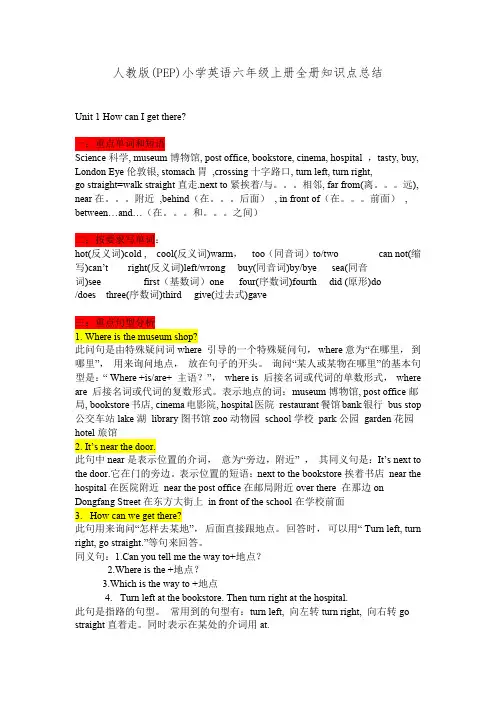
人教版(PEP)小学英语六年级上册全册知识点总结Unit 1 How can I get there?一:重点单词和短语Science科学, museum博物馆, post office, bookstore, cinema, hospital ,tasty, buy, London Eye伦敦银, stomach胃,crossing十字路口, turn left, turn right,go straight=walk straight直走.next to紧挨着/与。
相邻, far from(离。
远), near在。
附近,behind(在。
后面), in front of(在。
前面), between…and…(在。
和。
之间)二:按要求写单词:hot(反义词)cold , cool(反义词)warm,too(同音词)to/two can not(缩写)can’t right(反义词)left/wrong buy(同音词)by/bye sea(同音词)see first(基数词)one four(序数词)fourth did (原形)do/does three(序数词)third give(过去式)gave三:重点句型分析1. Where is the museum shop?此问句是由特殊疑问词where 引导的一个特殊疑问句,where意为“在哪里,到哪里”,用来询问地点,放在句子的开头。
询问“某人或某物在哪里”的基本句型是:“ Where +is/are+ 主语?”,where is 后接名词或代词的单数形式,where are 后接名词或代词的复数形式。
表示地点的词:museum博物馆, post office邮局, bookstore书店, cinema电影院, hospital医院restaurant餐馆bank银行bus stop 公交车站lake湖library图书馆zoo动物园school学校park公园garden花园hotel旅馆2. It’s near the door.此句中near是表示位置的介词,意为“旁边,附近” ,其同义句是:It’s next to the door.它在门的旁边。
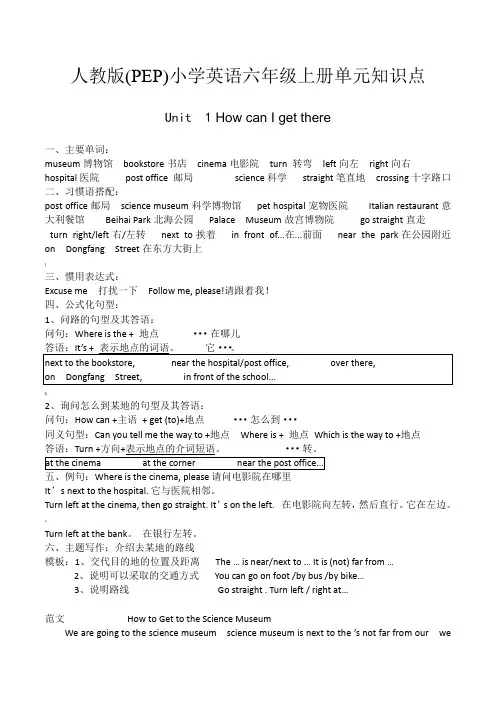
人教版(PEP)小学英语六年级上册单元知识点Unit1 How can I get there一、主要单词:museum博物馆bookstore书店cinema电影院turn 转弯left向左right向右hospital医院post office 邮局science科学straight笔直地crossing十字路口二、习惯语搭配:post office邮局science museum科学博物馆pet hospital宠物医院Italian restaurant意大利餐馆Beihai Park北海公园Palace Museum故宫博物院go straight直走turn right/left右/左转next to挨着in front of...在...前面near the park在公园附近on Dongfang Street在东方大街上}三、惯用表达式:Excuse me 打扰一下Follow me, please!请跟着我!四、公式化句型:1、问路的句型及其答语:问句:Where is the + 地点···在哪儿$2、询问怎么到某地的句型及其答语:问句:How can +主语+ get (to)+地点···怎么到···同义句型:Can you tell me the way to +地点Where is + 地点Which is the way to +地点五、例句:Where is the cinema, please 请问电影院在哪里It’s next to the hospital. 它与医院相邻。
Turn left at the cinema, then go straight. It’s on the left. 在电影院向左转,然后直行。
它在左边。
^Turn left at the bank。
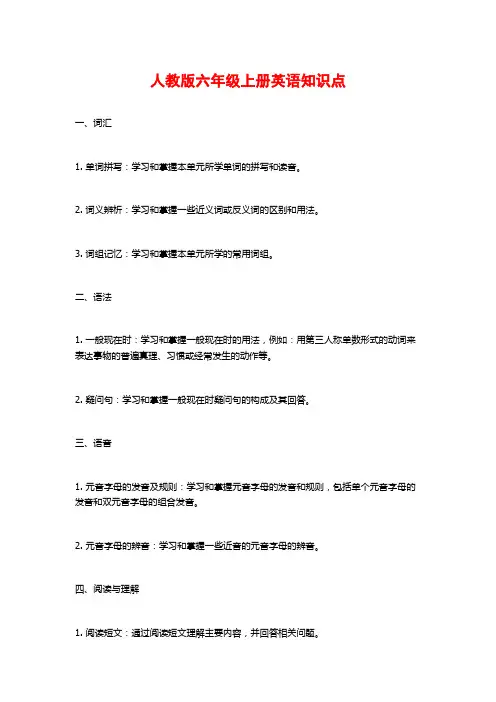
人教版六年级上册英语知识点
一、词汇
1. 单词拼写:学习和掌握本单元所学单词的拼写和读音。
2. 词义辨析:学习和掌握一些近义词或反义词的区别和用法。
3. 词组记忆:学习和掌握本单元所学的常用词组。
二、语法
1. 一般现在时:学习和掌握一般现在时的用法,例如:用第三人称单数形式的动词来表达事物的普遍真理、习惯或经常发生的动作等。
2. 疑问句:学习和掌握一般现在时疑问句的构成及其回答。
三、语音
1. 元音字母的发音及规则:学习和掌握元音字母的发音和规则,包括单个元音字母的发音和双元音字母的组合发音。
2. 元音字母的辨音:学习和掌握一些近音的元音字母的辨音。
四、阅读与理解
1. 阅读短文:通过阅读短文理解主要内容,并回答相关问题。
2. 根据上下文猜词义:通过上下文理解词义,并应用到具体的语境中。
五、写作
1. 填写单词:根据图片和提示填写单词,培养学生的观察力和动手能力。
2. 仿写句子:根据模板和相关词汇,进行句子仿写,培养学生的语言运用能力。
以上是人教版六年级上册英语的主要知识点概述,具体的知识点还需根据教材内容进行细化学习。
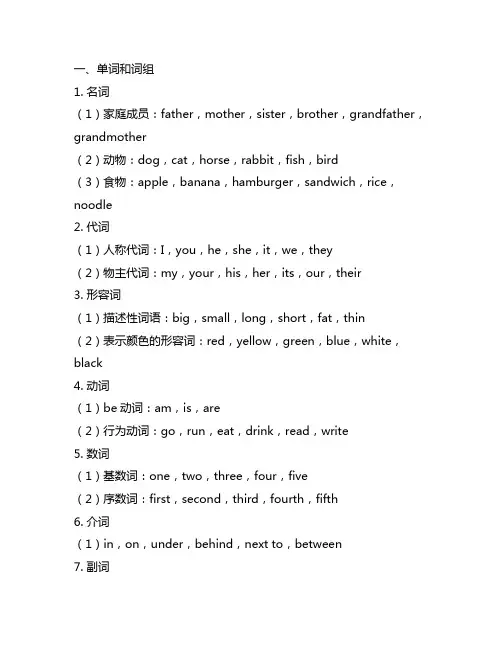
一、单词和词组1. 名词(1)家庭成员:father,mother,sister,brother,grandfather,grandmother(2)动物:dog,cat,horse,rabbit,fish,bird(3)食物:apple,banana,hamburger,sandwich,rice,noodle2. 代词(1)人称代词:I,you,he,she,it,we,they(2)物主代词:my,your,his,her,its,our,their3. 形容词(1)描述性词语:big,small,long,short,fat,thin(2)表示颜色的形容词:red,yellow,green,blue,white,black4. 动词(1)be动词:am,is,are(2)行为动词:go,run,eat,drink,read,write5. 数词(1)基数词:one,two,three,four,five(2)序数词:first,second,third,fourth,fifth6. 介词(1)in,on,under,behind,next to,between7. 副词(1)频度副词:always,usually,sometimes,never (2)程度副词:very,quite,too8. 连词(1)and,but,because9. 情态动词(1)can,could,may,might二、语法1. 一般现在时(1)肯定句形式:主语+动词原形+其他(2)否定句形式:主语+be动词+not+动词原形+其他(3)疑问句形式:Be动词+主语+动词原形+其他?2. 物主代词(1)第一人称单数:my(2)第二人称单数:your(3)第三人称单数:his,her,its(4)第一人称复数:our(5)第二人称复数:your(6)第三人称复数:their3. be动词(1)肯定句形式:主语+be动词+其他(2)否定句形式:主语+be动词+not+其他(3)疑问句形式:Be动词+主语+其他?4. 数词(1)基数词用法:表示数量,如one,two,three (2)序数词用法:表示顺序,如first,second,third 5. 介词短语(1)in/on/under+名词:表示位置(2)behind/next to/between+名词:表示位置关系三、对话1. 问候与介绍(1)Hello,I’m…(2)What’s your name?(3)How are you?2. 家庭成员介绍(1)This is my father/mother/sister/brother. (2)Is she your mother?(3)Yes, she is.3. 动物和食物(1)Do you have a pet?(2)Yes, I have a cat/dog/…(3)What’s your f avorite food?(4)My favorite food is…四、阅读1. 短文阅读Mary is a girl. She has a big family. She has a father, a mother, a sister and a brother. They have a dog and a cat. Mary’s favorite food is hamburger. She likes playing with her pets.2. 阅读理解(1)根据短文内容判断正误。
最新新人教版英语六年级上册知识点总结Unit 2 Ways to go to school 一.知识点归纳(一)、词汇四会bike ( 自行车) by ( 乘坐) slow down 慢下来bus (公共汽车) foot (脚)stop 停下来train (火车) how (怎样)plane ( 飞机) go to school (上学)ship (轮船) taxi 出租车ferry 轮渡sled 雪橇subway ( 地铁) (交通工具前加by ,表示乘坐,但步行要用on foot )交通工具traffic tools 其他 2 (二)、重点句型①询问交通方式用疑问代词——你怎样去/来上学?——我走路去/来上学. ——How does your father go to work ? 你父亲怎样去上班?——He goes to work by subway . 他坐地铁去上班. ②询问地点,用疑问代词where Where is your home ? 你家在哪里?It’s near the post office . 在邮局旁边. Where are the teachers ? 老师们在哪儿They are in the teacher’s office .在老师的办公室. ③问路:How can I get to the Fuxing Hospital? 我怎么去福星医院?You can take the No .1 bus . 你可以乘坐1路公交车. ④交通规则(traffic rules ):Stop and wait at a red light . 红灯停Go at a green light . 绿灯行Slow down and stop at a yellow light . 黄灯停⑤You must drive slowly. You must wear a life jacket. You must stop at a red light 你必须开慢点. 你必须穿救生衣. 你必须在红灯时停. Don’t go at a red light. Don’t run on the ferry. Don’t let the dogs run too fast. 不要在红灯时走. 不要在轮渡上奔跑. 不要让狗跑的太快. Unit 3 My weekend plan 一、知识点归纳(一)、词汇四会next week /weekend 下周/ 周末newspaper 报纸this morning 今天上午漫画书Time this afternoon 今天下午word book 单词书(时间) this evening 今天晚上this weekend 这个周末dictionary 字典tonight 今夜tomorrow 明天post card 明信片take a trip 去旅游theme park 主题公园activities see a film 看电影others pet shop 宠物店(活动)go to the supermarket 去看电影(其他)supermarket 超市visit my grandparents 参观祖父母shoe store 鞋店二、重点句式和句型:本单元中出现的一个重点语法是一般将来时:表示将要发生的动作或状态,常和表示将来的时间连用. 构成:陈述肯定句:主语+ be going to + 动词原形+ 其他例子I am going to (go to) the bookstore by bus this afternoon. He/ She is going to take a trip by train this weekend. We/ They are going to see a film tonight. 3 否定句:主语+ be + not going to +动词原形+其他例子I am not going to (go to) the bookstore by bus this afternoon. He/ She is not going to take a trip by train this weekend. We/ They are not going to see a film tonight. 一般疑问句:Be+ 主语+ going to +动词原形+其他? 例子:Are you going to the bookstore by bus this afternoon? Yes,I am . No,I’m not. Is he/ She going to take a trip by train this weekend?Yes,he/ She is. No,he/ She isn’t. Are we/ they going to see a film tonight? Yes,we/ they are. No,we/ they aren’t. 特殊疑问句:特殊疑问词+ 一般疑问句?例子:What are you going to do this afternoon? Where are you going this afternoon? How are you going to the bookstore this afternoon? When are you going to the bookstore by bus? (以上特殊疑问句中are you 可以替换为is he ,is she,are they,are we等) 三、重点句型: 1. we’re going to see a film about space trael! 我们将要去看关于火星之旅的电影.2. We are going to draw some pictures in Renmin Park.我们打算去人民公园画一些画.3. Havea good time!玩的愉快. 4. ----What are you going to do in the future? 你将来想干什么?----I’m going to be a science teacher one day. 或I want to be a science teacher one day. 我想将来有一天当科学老师. Unit 4 I have a pen pal 本单元的重点是谈论某人的兴趣爱好,语法是动词的-ing形式和动词的第三人称单数形式. 一、词汇:dance (dancing) 跳舞sing (singing ) 唱歌hobby play football (playing football) 踢足球(爱好)read story (reading stories ) 看故事hobbies do kung fu (doing kung fu ) 练武术live (lives) in Shiyan 住在十堰like (likes) 喜欢teach (teaches) English 教英语study ( studies Chinese 学习汉语) go (goes) hiking 去远足cook (cooks ) Chinese food 制作中国食物) 第三人单数watch (watches) TV 看电视read (reads) newspaper读报纸do (does) word puzzles 猜字谜二、句型:1.询问某人的兴趣爱好:①----What’s your hobby?(单数句式) What are your hobbies?(复数句式)你的爱好是什么?----I like reading stories and singing. 我喜欢读故事书和唱歌. I also like…我也喜欢…②---- What’s Peter’s (his) / Amy’s (her) hobby? (单数句式) What are Peter’s (his) / Amy’s (her) hobbies? (复数句式)---- He / She likes reading stories and singing. 他/ 她喜欢读故事书和唱歌 4 2. 表示征求别人意见:Can I also be his pen pal? 我也可以做他的笔友吗?Sure.当然. 三、语法用法:(1)表达喜欢做某事,通常要用动词的-ing 形式,即:like doing sth. 如:like singing / playing football / listening to music / playing the pipa / watching TV等(2)一般现在时的用法表示经常或习惯性的动作或状态,常与every day /morning /evening ,often,usually,always,sometimes 等状语连用. 如:We do morning exercises every day. He usually goes to school by bike. 结构:肯定句:主语+动词+其他. 如:Miss white teaches English. 否定句:主语+don’t/doesn’t +动词+其他如:Miss white doesn’t teach English. 一般疑问句:Do/ Does +主语+ 动词原形+其他?如:Does Miss White teach English? 肯否定回答:Yes,she does ./ No,she doesn’t . 备注:第三人称单数用does,doesn’t. 没有does,doesn’t 时动词必须要有变化. 四、语法记忆小锦囊★一般现在时用法记忆歌:肯定句的现在式,不是三单用原形,要是三单就加s,es,若是否定疑问句,没有be就加个do,碰到三单加does. 如把does加在前,动词就要还原形. ★第三人称单数记忆小诀窍:我不能S,你不能S,他们她们它们、大家都不能S. 谁S?他她它S. Unit 5 What does he do ? 一、知识点归纳(一)词汇四会singer (歌手) writer ( 作家) Hong Kong ( 香港) head teacher 校长dancer 舞蹈家sea (大海)worker ( 工人) cleaner 清洁工factory ( 工厂) postman ( 邮递员) driver 司机stay ( 保持) businessman ( 商人) secretary 秘书university (大学) football player 足球运动员help ( 帮助) fisherman (渔民) money (金钱) scientist ( 科学家) gym ( 体育馆) police officer (警察) use ( 使用pilot ( 飞行员) type ( 打字) coach (教练) cook(厨师)quickly ( 迅速地) (二)重点句型职业job 三会 5 ①询问职业What does he(she) do ?/What is he(she) ?/What’s his(her) job? 他是做什么的?He/ She is a doctor. 他是一个医生. What do you do ?/What are you ? / What’s your job? 你是做什么的?I ’m a student . 我是一个学生.②询问工作的地点Where do you work ? 你在哪儿工作?I work in a school . 我在一个学校工作. Where does she / your mother work ? 她/ 你妈妈在哪儿工作?上词可替换. She works in a hospital . 她在一个医院工作. 一般疑问句:Does he work in a factory ? 他在工厂工作吗Yes ,he does . 是的.③询问怎样去工作How does your father go to work ? 你父亲怎么去上班?上词可替换. He goes to work by car . 他开车去上班. ④He works very hard and stays healthy. 他工作很努力而且保持健康. We should study hard and stay healthy. 我们应该努力学习并且保持健康. healthy life 健康生活lots of fish 许多鱼other cuntries 其他国家Unit 6 How do you feel? 重点单词:angry 生气的see a doctor 看病afraid 害怕的take a deep breath 深吸一口气情绪sad 难过的count to ten 数到十worried 担心的wear warm clothes 穿暖点happy 高兴地do more exercise 多锻炼重要句型: 1、They’re afraid of him. 他们害怕它. 2、The cat is angry with him. 这只猫很生他们的气. 3、What’s wrong ? Your father is ill. 怎么了?你爸爸病了. 4、Don’t be sad . 别伤心. 5、How do you feel ?你感觉怎么样?I am sad. 或I feel sad. 我很难过. How does Oliver / Amy / XX feel ? He / She is …. 或He / She feels …6、What should I / he / she / XX do ? 我/他/她/某人应该怎么做?You / He / She should + 动词原形(表示建议)你/他/她应该…。
六年级英语人教上册重点
六年级英语人教上册的重点内容包括以下几个方面:
1. 语音:
-元音字母组合及发音规则
-辅音字母的发音规则
-单词重音的规则
2. 词汇:
-常见动词和动词短语
-基本的名词和名词短语
-常见形容词和形容词短语
-常用副词和介词
-基本的冠词和代词
3. 语法:
-现在进行时的构成和用法
-一般过去时的构成和用法
-比较级和最高级形式的构成和用法
-人称代词的主格和宾格形式
-一般疑问句的构成和回答方式
4. 句型:
-肯定句、否定句和疑问句的变化规则
-否定前移句型
- There be句型的构造和用法
-祈使句的构造和用法
-感叹句的构造和用法
5. 阅读与理解:
-短文阅读和根据短文回答问题
-利用上下文猜测词义
-根据语境猜测句子的意思
-根据关键词细品短文大意
这些内容是六年级英语人教上册的重点,希望对你有帮助!。
人教版小学六年级英语上册知识点总结和复习要点一、词汇积累与应用1基本词汇熟练掌握课本中出现的各类基本词汇,如名词、动词、形容词、副词等。
特别注意动词的过去式、现在分词和第三人称单数形式的变化。
例子:名词:festival(节日)、tradition(传统)、present(礼物)动词:visit(拜访)、celebrate(庆祝)、travel(旅行)形容词:happy(快乐的)、special(特别的)、interesting (有趣的)2短语与固定搭配记忆并理解课本中常用的短语和固定搭配,能够正确运用到句子中。
例子:短语:have a good time(玩得开心)、make a snowman (堆雪人)、be interested in(对……感兴趣)二、句型结构与语法1陈述句复习并巩固陈述句的基本结构,能够正确构建和表达完整的句子。
例子:陈述句:I like playing football in the afternoon.(我喜欢下午踢足球。
)2疑问句学习和掌握特殊疑问句、一般疑问句及其回答方式,能够准确理解并回答问题。
例子:特殊疑问句:What do you usually do on your birthday?(你生日通常做什么?)回答:I usually have a birthday party with my friends.(我通常和朋友们一起举办生日派对。
)3祈使句巩固祈使句的基本用法,能够正确使用祈使句表达请求、命令或建议。
例子:祈使句:Please don’t forget to bring your homework tomorrow.(请别忘了明天带作业来。
)4时态复习并巩固一般现在时、一般过去时、一般将来时和现在进行时等时态的基本用法和形式。
例子:一般现在时:She often reads books after dinner.(她晚饭后经常看书。
)一般过去时:We went to the zoo last weekend and saw many animals.(我们上周末去了动物园,看到了很多动物。
人教版小学六年级上册英语知识点归纳第一单元:四会单词:young年轻的funny滑稽可笑的tall高的strong强壮的kind和蔼的old年老的short矮的thin瘦的Mr先生like像;喜欢strict严格的smart聪明的;巧妙的active积极的;活跃的quiet安静的;文静的very很;非常but但是缩写形式:who’s=who is what’s=what is he’s=he is she’s=she is重要句型:1.Who’s your art teacher?你们的美术老师是谁?----Mr Hu.胡先生.2.What’s he like?他长得什么样子? ----He’s short and thin.他又矮又瘦3.Is she young?她年轻吗?----Yes,she is/No, she isn’t.以前的知识:I have a new math teacher.我有一个新数学老师.(小学三年级已经学过I havea pen.)注意: 划线部分可以替换.第二单元:四会单词:Monday 星期一 Tuesday星期二Wednesday星期三 Thursday星期四Friday 星期五Saturday星期六 Sunday 星期日day天;日子have有;吃on 在……时候too也;太短语:do homework 做作业watch TV 看电视read books 读书What about? ......怎么样?do housework 做家务play computer games 玩电脑游戏重点句型:1.What day is it today?今天星期几?—It’s Monday.星期一.2. What do we have on Mondays?星期一我们有什么课?—We have English,science,computer and P.E.我们有英语课,科学,计算机跟体育课.3.What do you do on Saturdays?星期六你干什么?(具体的某一天前用介词on,在具体的时间前,用介词at)—I often do my homework.我通常做家庭作业.4.What about you?你呢?—I do my homework,too.我也是做家庭作业.第三单元:四会单词:eggplant 茄子fish 鱼green beans 青豆tofu 豆腐potato 土豆tomato 西红柿for 为;给lunch 中餐;午饭we 我们tasty 好吃的;可口的sweet 甜的sour 酸的fresh 新鲜的salty 咸的favourite 最喜爱的;特别喜爱的fruit 水果grape 葡萄缩写形式:they’re=they are don’t=do not重点句型:1.What would you like for lunch?你午餐想吃什么?-----I’d like some tomatoes and mutton.我想吃一些西红柿跟羊肉.2.What’s your favourite fruit?你最喜欢的水果是什么?------/I like apples.我喜欢苹果.3.I don’t like grapes.我不喜欢葡萄.4.Bananas are my favourite.我最喜欢香蕉.第四单元一. 单词:empty the trash倒垃圾cook the meals 做饭water the flowers浇花sweep the floor扫地clean the bedroom打扫卧室make the bed铺床set the table摆餐具wash the clothes洗衣服do the dishes洗碗碟put away the clothes收拾衣服can’t = cannot(不会;不能)use a computer(使用计算机)二. 句子:1. I’m helpful!I can sweep the floor。
人教版PEP英语六年级上册知识点归纳Unit 1 How can I get there?一、核心词汇1.名词: science科学museum博物馆bookse书店cinema电影院hospital医院crossing十字路口2.动词: turn转弯3.副词: left左right右straight笔直地4.短语: post office邮局二、了解词汇1.名词: sir先生restaurant餐馆pizza比萨饼street大街;街道GPS全球(卫星)定位系统feature特点2.动词: ask问get到达ge(give的过去式)提供;交给follow跟着tell告诉3.形容词: interesting有趣的Italian意大利的far较远的三、核心句型1.—Where is the cinema?电影院在哪儿?—It’snext to the bookse.紧挨着书店。
2. How can we get there?我们怎么到那儿?3. Turn left at the bookse. Then turn right at the hospital.到书店左转。
然后到医院右转。
注意:要注意介词的固定搭配。
Turn left/right at the…到……左/右转。
Get off at the…在……下车。
It’son the left/right.在左/右边。
Walk/Go straight for…minutes.步行/直走……分钟。
It’seast/west/south/north of the…在……东/西/南/北边。
It’sfar from the…距离……远。
四、了解句型1. Is there a…?……有……吗?拓展: there be句型(1)主要用以表达“某处(某时)有某人(某物)”,其基本句型为“There+be动词+名词+介词短语+其他.”There is a football under the chair.椅子下面有一个足球。
人教版六年级英语上册各单元知识点汇总Unit 1 How do you go to school?一、重点短语:by plane 坐飞机by ship 坐轮船on foot步行by bike 骑自行车by bus 坐公共汽车by train 坐火车traffic lights 交通灯traffic rules交通规则go to school 去上学get to 到达get on上车get off下车Stop at a red light. 红灯停Wait at a yellow light. 黄灯等Go at a green light. 绿灯行二、重点句型:1.How do you go to school?你怎么去上学?ually I go to school on foot. Sometimes I go by bus.通常我步行去上学。
有时候骑自行车去。
3.How can I get to Zhongshan Park ?我怎么到达中山公园?4.You can go by the No. 15 bus. 你可以坐15路公共汽车去。
三、重点语法:1、There are many ways to go somewhere.到一个地方去有许多方法。
这里的ways一定要用复数。
因为there are是There be句型的复数形式。
2、on foot 步行乘坐其他交通工具大都可以用介词by…,但是步行只能用介词on 。
4、go to school的前面绝对不能加the,这里是固定搭配。
5、USA 和US 都是美国的意思。
另外America也是美国的意思。
6、go to the park 前面一定要加the. 如果要去的地方有具体的名字,就不能再加the ,如果要去的地方没有具体名字,都要在前面加the. (go to school除外。
)7、How do you go to …?你怎样到达某个地方?如果要问的是第三人称单数,则要用:How does he/she…go to …?8、反义词:get on(上车)---get off(下车)near(近的)—far(远的)fast(快的)—slow(慢的)because(因为)—why(为什么)same(相同的)—different(不同的)9、近义词:see you---goodbye sure---certainly---of course10、频度副词:always 总是,一直usually 通常often经常sometimes 有时候never 从来不Unit 2 Where is the science museum?一、重点短语:library 图书馆post office 邮局hospital医院cinema 电影院bookstore书店science museum科学博物馆turn left向左转turn right 向右转go straight 直行north北south南east东west西next to靠近、与……。
人教版六年级上册英语知识点总结Unit 1单词far from 远离,离得远tell 告诉science museum 科学博物馆ask 问post office 邮局sir 先生bookstore 书店interesting 有趣的cinema 电影院Italian 意大利的hospital 医院restaurant 餐馆crossing 十字路口pizza 比萨饼turn left 向左转street 大街;街道turn right 向右转get to 到达go straight 直走GPS 全球定位系统feature 特点gave (give) 提供;交给follow 跟着far 较远的Unit 2 单词on foot 步行early 早到的by bus 乘公共汽车helmet 头盔by subway 乘地铁must 必须by taxi 乘出租车wear 穿;戴by plane 乘飞机pay attention to 注意by ship 乘船traffic lights 交通信号灯by train 乘火车fast 快的by bike 骑自行车Munich 慕尼黑by ferry 乘轮渡Germany 德国by sled 乘雪橇Papa Westrary 帕帕韦斯特兰岛slow down 慢下来减速Scotland 苏格兰stop 停止Alaska 阿拉斯加州(美国)wait 等待Mrs 夫人Unit3 单词visit my grandparents 拜访祖(外)父母this evening 今晚see a film 看电影next week 下周take a trip 旅行lesson 课go to the supermarket 去超市(购物)space 太空dictionary 词典travel 旅行comic book 连环画册half price 半价word book 单词书Mid-autumn Festival 中秋节postcard 明信片get together 聚会this morning 今天早上mooncake 月饼tonight 今晚moon 月亮this afternoon 今天下午about 关于tomorrow 明天have a big dinner 吃大餐(丰盛的晚餐)Unit4 单词dancing(dance)跳舞listening(listen) to music 听音乐singing (sing) 唱歌drawing (draw)cartoons 画漫画reading (read)stories 读故事cook(s) Chinese food 做中国菜playing(play) football 踢足球study(studies) Chinese 学汉语(字、语文)doing(do) kung fu 练功夫do(does) word puzzles 猜字谜play sports 做运动go(goes)hiking 远足watch TV 看电视hobby(复hobbies) 爱好climbing (climb)mountains 爬山pen pal 笔友play the pipa 弹琵琶jasmine flower 茉莉花Good idea 好主意amazing 令人惊讶的Canberra 堪培拉shall 表征求意见goal 射门club 俱乐部join 加入share 分享Unit5 单词factory worker 工厂工人university 大学postman 邮递员gym 体育馆businessman 商人if 如果police officer 警察reporter 记者fisherman 渔民use 使用scientist 科学家type 打字pilot 飞行员quickly 迅速地coach 教练secretary 秘书country 国家;乡村boat 船head teacher 校长sea 大海stay 保持Unit 6 单词angry 生气的bad 邪恶的;坏的afraid 害怕hurt (使)受伤sad 难过的ill 有病;不舒服worried 担心的;发愁的wrong 有毛病happy 高兴的should 应该see a doctor 看病feel 觉得;感到do more exercise 多做运动well 健康;身体好wear warm clothes 穿暖户的衣服sit 坐take a deep breath 深吸一口气grass 草坪count to ten 数到十hear 听见chase 追赶ant 蚂蚁mice(mouse的复数)老鼠worry 担心;担忧stuck 陷住, 无法移动pull 拉;拽mud 泥everyone 每人新六上英语重点句子☆为四会句子U1☆1、☆Where is the museum shop?博物馆的商店在哪儿?☆☆2、It’s near the door.在大门附近。
☆3、I want to buy a postcard. 我想买一张明信片。
4、I want to send it today. 我想今天寄出。
5、I’ll ask.我去问问。
6、Wow, a talking robot! 哇!一个讲话机器人。
7、What a great museum! 好棒的一家博物馆!8、There is a pet hospital in my city. 在我的城市有一家宠物医院。
9、Wu Yifan and Robin are looking at some robots. 吴一凡和罗宾正在看一些机器人。
☆10、How can we get there?我们怎么到那儿?☆☆ 11、Turn left at the bookstore.在书店左转。
☆12、I know a great Italian restaurant.我知道一家很棒的意大利餐厅。
13、Chen Jie is trying to be a tour guide for Oliver in Beijing. 陈洁正试图给奥利佛当北京的向导。
14、Wu Yinfan’s grandpa gave Robin a new feature.吴一凡的爷爷给罗宾增加了一个新功能。
X15、My new GPS works!我的全球定位系统起作用了。
16、My stomach hurts.我的胃不舒服了。
U2☆1、How do you come to school?你怎么来学校的?☆☆2、Usually, I come on foot.通常我走路来。
☆☆3、Don’t go at the red light!别闯红灯!☆☆4、I must pay attention to the traffic lights!我必须注意交通信号灯!☆☆ 5、In the USA people on bikes must wear one.在美国骑自行车的人必须戴(头盔)。
☆U3☆1、What are you going to do tomorrow?你明天打算做什么?☆☆2、I’m going to hav e an art lesson.我要上美术课。
☆☆3 We’re going to draw some pictures in Renmin Park.我们要到人民公园去画画。
☆4、I’m going to see a film.我打算去看电影。
5、I’m going to visit my grandparents.我打算去看望外祖父母。
☆6、Where are you going?你们打算去哪儿?☆☆7、We’re going to the cinema.我们打算去电影院。
☆☆8、When are you going?你们什么时候去?☆9、I’m going to buy a new comic book.我打算去买一本新漫画书。
10、What are you going to buy?你打算买什么?11、My aunt is going to make mooncakes.我的阿姨将做一些月饼。
-12、My grandma will tell us a story about Chang’e.我奶奶(外婆)将会给我们讲嫦娥的故事。
☆U4 1、What are Peter’s hobbies?彼得有什么爱好?☆☆2、He likes reading stories.他喜欢读故事。
☆3、He lives on a farm, so sometimes he reads to the cows.4、他住在农场上,有时候他给奶牛讲故事。
5、He likes doing kung fu and swimming.他喜欢练武术和游泳。
6、He also likes singing.他还喜欢唱歌。
☆7、Does he live in Sydney?他住在悉尼吗?☆☆8、No, he doesn’t.不,他没有。
☆☆9Does he like doing word puzzles and going hiking?他喜欢猜字谜和远足吗?☆☆10、Yes, he does.是的,他喜欢。
☆11、He lives in Australia, but he studies Chinese.他住在澳大利亚,但是他学习中文。
U5☆1、What does he do?他是做什么的?☆☆2、He’s a businessman.他是商人。
☆3、He often goes to other countries.他经常去其他国家。
4、What does your mother do?你妈妈是做什么的?5、She’s a head teacher.她是一名校长。
6、Do you want to be a head teacher, too?你也想成为一名校长吗?7、I want to be a taxi driver.我想成为一名出租车司机。
☆8、Where does he work?他在哪儿工作?☆☆ 9、He works at sea.他在海上工作。
☆☆10、How does he go to work?他怎么上班?☆☆11、He goes to work by bike.他骑自行车上班。
☆12、He has a very healthy life.他有一个很健康的生活。
13、He works very hard and stays healthy.他工作很努力,身体很健康。
14、She works at a university.她在一所大学工作。